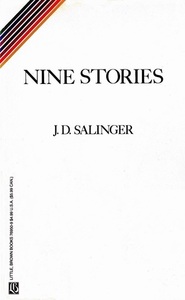You need to sign in or sign up before continuing.
Take a photo of a barcode or cover
God, so good. Quick, funny. Really saved the best for last (Teddy).
Amazing set of stories. Looking forward to picking them apart further.
dark
funny
reflective
Plot or Character Driven:
Character
Strong character development:
No
Loveable characters:
No
Diverse cast of characters:
Yes
Flaws of characters a main focus:
Yes
Not necessarily my cuppa. Had to force my way through some of this. Still, it’s ostensibly morose, smart, and funny in true Salinger fashion. I think it’s a really effective character study, in the short form—giving a similar vibe to watching an episode of White Lotus: off-putting, leaves you wanting more, kind of slow, but illuminating in a twisted way?
Favorite outtakes:
In De Daumier-Smith’s Blue Period, our narrator fabricates his CV most audaciously (a family friendship with Picasso is but one of his qualifying points), only to end up in a totally frustrating and lonely job, facing mounting imposter syndrome. In a turning point moment, all of his overwhelm comes to a head and he nearly comes out with the truth to his boss:
“I think I was afraid I might get over to his desk only to report, shrilly: ‘My mother’s dead, and I have to live with her charming husband, and nobody in New York speaks French, and there aren’t any chairs in your son’s room. How do you expect me to teach these two crazy people how to draw?’ In the end, being long self-trained in taking despair sitting down, I managed very easily to keep my seat. I opened my third student’s envelope.”
I just fucking love that this kid almost understandably crashes out in a situation both of his making and a result of his grief and confusion then just sighs and deals and does the next thing. Too real.
BEING LONG SELF-TRAINED IN TAKING DESPAIR SITTING DOWN—okay, bars.
Then, in Teddy:
“The trouble is, most people don’t want to see things the way they are. They don’t even want to stop getting born and dying all the time. They just want new bodies all the time, instead of stopping and staying with God, where it’s really nice.” He reflected. “I never saw such a bunch of apple-eaters,” he said.
(Referencing the apple Adam—and notably Salinger credits Adam, not Eve—eats; the apple being “logic and intellectual stuff.”)
Graphic: Suicide
dark
mysterious
reflective
slow-paced
Plot or Character Driven:
A mix
Strong character development:
Complicated
Loveable characters:
Complicated
Diverse cast of characters:
Yes
Flaws of characters a main focus:
Complicated
It's weird. I read Bananafish in high school and was hit so hard by it that it scared me off of the entire collection for years. in 2017 I found a copy in my mother-in-law's reading room and read most of the collection, but stopped short of reading Teddy due to its length/the time I had to read.
Well, some two years later Nine Stories was dropped on my desk at the library so I finished it up, and WOOF. What a doozy of an ending!
I have a particularly ostentatious friend who is obsessed with this book and I would be lying if I said I wasn't thinking about that the whole time. She named her daughter Esme and said that she would've been named Teddy if she were born a boy. Having just read "Teddy"...hoo boy! What an interesting thing to almost do!
Salinger is a genius and I'm not going to challenge that, obviously. I loved Catcher so much as a kid, and though it's been many years now since I've read it, I still remember it fondly and have even defended it to folks whose distaste seems purely due to a surface reading, a linguistic era challenge, and because they were forced to read it in school. I think what Catcher has on these titular nine stories is a compelling lead. Hate Holden all you want, most will agree that he's at least entertaining. The leads in these stories vary as much as the stories themselves do, but I found it very difficult overall to connect with the main characters. Salinger's collection of rich, cynical New Yorkers is just so far from who I am, and though I often found them (and the writing conjuring them up) to be fascinating, their coldness also proved a sometimes opaque wall to push through. I tend to like Salinger when he's a bit more vulnerable, perhaps even more sentimental--such as in "Esme" which is probably my favorite of the bunch--rather than the gloom and edge of his typical style. The collection, even with its trim number, is as uneven as most short fiction collections have proven to be, by my reckoning. Some of the stories are meandering in a fascinating naturalistic style while others dip into looping tedium. The barbs which his characters cut at each other with is sometimes a true mimic of the mess of American conversation while other times proves difficult to follow and a bit circuitous. Some stories feel complete in tone and theme and earn their word count, whereas a couple feel a bit of a trifle. Still, I feel this reflects too negatively, I did enjoy the book on the whole.
Something that did surprise me on this reading was the sense of dread that so often looms over these stories and their doomed characters. You can tell that JDS was in various stages of processing the horrors that he had seen, the stories often reflecting his outlook. For instance, the first and last story suggest an author who has either given up on the world or surrendered to the awfulness that he feels at its core. They mirror one another with these two people in the sunshine yet destined for an impending death brought on by their own hands. It's a pretty loud cry for help, I though. In Uncle Wiggly and others it feels as though JDS is both sneering at and pitying these rich fools and their foibles, with tragedy hiding just off the page, just under their skin. He doesn't neccesarily condemn them, but he doesn't redeem them or save them, either. He allows them to drift in the ocean that he sees life as, bitter and lonely and angry, perhaps as he was. Then there's Esme, which I think is the only true hopeful story here, which should be an indicator of why it's my favorite. That moment of X removing the watch and beginning his ascent from the darkness that the pall of war has pulled him down into, well that got me good. I've been to plenty of dark places, as I'm sure we all have in our time, and call me a softie, but while I enjoy dark stories as much as most of my ilk, I'll take a glimmer of hope, of the healing suggested by Esme's letter, any day of the week.
Well, some two years later Nine Stories was dropped on my desk at the library so I finished it up, and WOOF. What a doozy of an ending!
I have a particularly ostentatious friend who is obsessed with this book and I would be lying if I said I wasn't thinking about that the whole time. She named her daughter Esme and said that she would've been named Teddy if she were born a boy. Having just read "Teddy"...hoo boy! What an interesting thing to almost do!
Salinger is a genius and I'm not going to challenge that, obviously. I loved Catcher so much as a kid, and though it's been many years now since I've read it, I still remember it fondly and have even defended it to folks whose distaste seems purely due to a surface reading, a linguistic era challenge, and because they were forced to read it in school. I think what Catcher has on these titular nine stories is a compelling lead. Hate Holden all you want, most will agree that he's at least entertaining. The leads in these stories vary as much as the stories themselves do, but I found it very difficult overall to connect with the main characters. Salinger's collection of rich, cynical New Yorkers is just so far from who I am, and though I often found them (and the writing conjuring them up) to be fascinating, their coldness also proved a sometimes opaque wall to push through. I tend to like Salinger when he's a bit more vulnerable, perhaps even more sentimental--such as in "Esme" which is probably my favorite of the bunch--rather than the gloom and edge of his typical style. The collection, even with its trim number, is as uneven as most short fiction collections have proven to be, by my reckoning. Some of the stories are meandering in a fascinating naturalistic style while others dip into looping tedium. The barbs which his characters cut at each other with is sometimes a true mimic of the mess of American conversation while other times proves difficult to follow and a bit circuitous. Some stories feel complete in tone and theme and earn their word count, whereas a couple feel a bit of a trifle. Still, I feel this reflects too negatively, I did enjoy the book on the whole.
Something that did surprise me on this reading was the sense of dread that so often looms over these stories and their doomed characters. You can tell that JDS was in various stages of processing the horrors that he had seen, the stories often reflecting his outlook. For instance, the first and last story suggest an author who has either given up on the world or surrendered to the awfulness that he feels at its core. They mirror one another with these two people in the sunshine yet destined for an impending death brought on by their own hands. It's a pretty loud cry for help, I though. In Uncle Wiggly and others it feels as though JDS is both sneering at and pitying these rich fools and their foibles, with tragedy hiding just off the page, just under their skin. He doesn't neccesarily condemn them, but he doesn't redeem them or save them, either. He allows them to drift in the ocean that he sees life as, bitter and lonely and angry, perhaps as he was. Then there's Esme, which I think is the only true hopeful story here, which should be an indicator of why it's my favorite. That moment of X removing the watch and beginning his ascent from the darkness that the pall of war has pulled him down into, well that got me good. I've been to plenty of dark places, as I'm sure we all have in our time, and call me a softie, but while I enjoy dark stories as much as most of my ilk, I'll take a glimmer of hope, of the healing suggested by Esme's letter, any day of the week.
challenging
dark
emotional
funny
reflective
sad
medium-paced
Plot or Character Driven:
A mix
Strong character development:
Yes
Loveable characters:
Yes
Diverse cast of characters:
No
Flaws of characters a main focus:
Yes
dark
funny
reflective
tense
medium-paced
Plot or Character Driven:
Character
Strong character development:
No
Loveable characters:
Yes
Diverse cast of characters:
Yes
Flaws of characters a main focus:
Yes
Why did I wait so long to read this? Salinger is a master of minimalist writing and his sensibilities appeal to me greatly. This is a book I'll return to again and again to discover new meaning. Pretty sure the ending to A Perfect Day for Bananafish will always shock me




